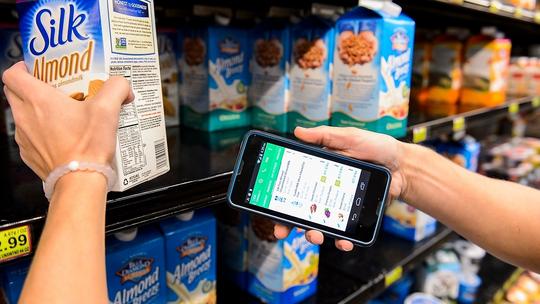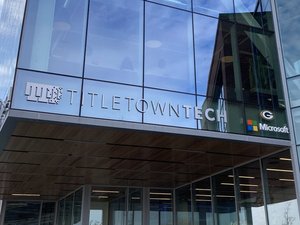
For many Wisconsinites, the start of the pandemic is a hazy blur.
Sometime in early March, work became an endless stream of Zoom conference calls, shopping became panic buying, and the constant flood of Covid-19 news reports gave way to health concerns and economic anxiety. The long stretch of socially-distant days blended from one into the next, making two months feel like a lifetime.
Not so for Jeremy Neren, the founder and CEO of the Madison-based white label e-commerce platform, GrocerKey. He remembers the exact day the coronavirus crisis hit home.
“It was March 13,” Neren says in a phone call. “Everything unraveled from there.”
Within the week, Neren says GrocerKey experienced a mass exodus of employees when roughly one-third of the startup’s workforce—by then, collectively monikered essential workers as they were in-store fulfillment workers—departed the company to avoid exposure to the coronavirus.
At the same time, the company saw an unprecedented amount of orders streaming into its e-commerce platform and a rapidly growing pipeline of grocer retailers scrambling to kick their digital transformation efforts into high gear.
It wasn’t the worst position to be in. As thousands of Wisconsin’s companies issued a swell of layoffs, GrocerKey embarked on a hiring spree to meet the increased demand for curbside pick-up and home delivery services, providing more than 300 new e-commerce fulfillment jobs to people in the process.
For GrocerKey, the grocery industry proved exactly the right place to be.

That hasn’t been the case for many up-and-coming startups—or even for more mature ventures. By the first week in April, at least 50 startups, including Bird and Airbnb, cut or furloughed roughly 6,000 workers in Silicon Valley alone, a disconcerting trend that carried out across the country’s major tech hubs.
In Wisconsin, where the tech sector accounts for about 7 percent of the state’s economy, the industry has fared better than others. A survey by the Wisconsin Technology Council reported just 11 percent of tech companies were significantly affected by the pandemic, though roughly a quarter had put hiring on hold.
Neren is the first to acknowledge his good fortune, though he does so with a tinge of caution in his voice.
“There is a high degree of luck,” he says. “We’re fortunate to be in the right place at the right time. People need food. We’re trying to take advantage of that, but be cautious of how staff are being impacted by everything.”
As retailers worked to enforce social distancing at their brick-and-mortar locations, for example, GrocerKey was suddenly confronted by the challenge to supply its fulfillment team with the appropriate masks, gloves, hand sanitizers, and PPE to ensure their safety during work hours.
It took several weeks to get items in stock, serving Neren yet another stark reminder the country was combatting a serious health pandemic.
“We’re just trying to be proactive,” Neren says in early May. “It’s definitely challenging, even for us where it’s been going really well. This has been the most stressful stretch for me as an entrepreneur. From a business perspective, it keeps you up at night.”
Neren launched his first startup, Madtown Munchies, in the early aughts. The business delivered convenience-store items to college students. That work eventually led Neren to build his own B2B e-commerce software platform to serve retailers. After participating in the gener8tor business accelerator program and successfully drawing investor interest, Neren formally launched GrocerKey in 2014.
"This has been the most stressful stretch for me as an entrepreneur."
Since then, the company has raised more than $6.5 million in funding and reported revenues near $7 million in 2019.
Today, GrocerKey provides a full suite of digital tools used to enable click-and-collect, home delivery, and mobile self-checkout to the company’s 16 partner retailers. The company counts Berkot’s Super Foods, Kowalski’s, Kings Food Markets, and Woodman’s Markets among its customers. GrocerKey additionally handles in-store fulfillment operations for Woodman’s.
Neren says GrocerKey’s retail-branded platform allows brick-and-mortar operations to compete in a modern landscape dominated by big-box stores such as Walmart, and tech giants like Amazon and Instacart, who are quickly laying groundwork in an industry ripe for disruption—and growing.
“Retailers are starting to realize that because the customer ultimately orders from Instacart, they are not their customers,” Neren says. “We are the answer to that problem. The retailer truly owns their customer. It’s their branded platform.”
According to McKinsey & Company, online ordering represents just 5 percent of the grocery industry as a whole, or roughly $35 billion, says Neren, though he has seen projections as high as $100 billion, and that was before the coronavirus. But the industry’s laggard adoption of tech, as well as customers’ preference for in-store shopping, has made retailers slow to jump aboard the e-commerce train.
The coronavirus has accelerated that timeline, Neren says.
“There has always been an element of friction to retailers who have a million other things to worry about it—this is just one more thing on their plate,” says Neren, adding one retailer grew from just a handful of orders in a single day, to more than 500 during the pandemic. “In the past, we really had to push retailers to get through the implementation process. Now it’s like ‘How can we push this faster?’”
With Wisconsin’s stay-at-home order winding down by mid-May, Neren was feeling less pressure. As the company’s staffing issues stabilized, the company switched its focus to fueling its growth for the future ahead, including with a few major retailers who were “on the one-yard line.”

Neren expects some of the volume to taper off, though he is already seeing positive industry trends that will likely carry out post-coronavirus.
“We’re seeing more and more consumer demand,” he explains. “We’re starting to feel like there are fewer fires to put out. There is a heightened need for convenience, and I think generally people are becoming more comfortable and have accepted that this is the way [of the future].”
It helps that there is more industry disruption on the way. Several states, including Wisconsin, have passed flexibility measures to allow food stamp recipients to purchase groceries online. Neren says that opportunity not only assuages an ongoing social issue but also poses as a potential boon to low-cost grocery retailers like Woodman’s who weren’t able to accept online payments from EBT before.
“It’s a big deal,” Neren says. “We’re already taking steps to bring that to fruition. I think the whole grocery industry has been a huge beneficiary of this coronavirus. We’re definitely going to see lasting impact.”
Internally, Neren says operating under the strain of the coronavirus crisis has pushed GrocerKey to ramp up the company’s hiring and training processes and streamline customer onboarding to help retailers start selling online more quickly.
So far, the company’s proactive approach appears to be paying off. Neren says GrocerKey has experienced an 85 percent increase in sales in the second quarter of 2020, when compared to the same period last year. And the company is on track to making $12 million in revenue for the year, though it’s difficult to predict with the present uncertainty.
“I still continue to have concerns for humanity,” Neren says. “I’m obviously concerned about the economy. But for us as a business, it’s strengthened my confidence in the company. Anytime you work through challenges, and you get to see everyone work together, it brings you closer together.
“We’re going to be a lot more resilient.”








